|
|
|
Sort Order |
|
|
|
Items / Page
|
|
|
|
|
|
|
| Srl | Item |
| 1 |
ID:
155166
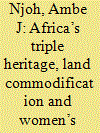

|
|
|
|
|
| Summary/Abstract |
Women have less access to land than men in Africa. Previous analyses have typically identified African indigenous culture as the problem’s exclusive source. With Cameroon, Kenya and Sierra Leone as empirical referents, an alternative explanation is advanced. Here, the problem is characterized as a product of Africa’s triple heritage, comprising three main cultures, viz., African indigenous tradition, European/Christianity and Arabia/Islam. The following is noted as a major impediment to women’s access to, and control of, land: the supplanting of previously collective land tenure systems based on family or clan membership by ‘ability-to-pay’ as the principal determinant of access to land.
|
|
|
|
|
|
|
|
|
|
|
|
|
|
|
|
| 2 |
ID:
182463
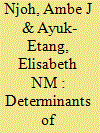

|
|
|
|
|
| Summary/Abstract |
This paper analyzes ecofeminism operationalized as the relationship between women and the natural environment. It treats ecofeminism as context-dependent and not a universal construct as suggested in the literature. It focuses on the political, economic, social, technological, ecological, cultural and historical (PESTECH) context of ecofeminism in Anglophone Cameroon, a polity with a unique pre-colonial, colonial and post-colonial experience. Each dimension is shown to impact women–nature relations in its own unique way. This underscores the need to be more discerning and attentive to context in any analysis of ecofeminism.
|
|
|
|
|
|
|
|
|
|
|
|
|
|
|
|
| 3 |
ID:
166364
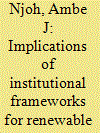

|
|
|
|
|
| Summary/Abstract |
This study analyzed a rural renewable energy project—the Esaghem Village solar photovoltaic-based electrification project—in Manyu Division, Cameroon. The aim was to unveil impediments to the project rooted in the country's institutional framework for energy policy administration. The framework adheres to the country's Weberian-style administrative machinery. Conspicuous features of the machinery, including its pyramidal structure, tendency for top-down hierarchical communication, aversion for interorganizational interaction, and standardization are shown to constitute major institutional impediments. These features caused problems such as a lack of information, skills, and innovation. They also exacerbated problems relating to custom formalities and stand to threaten project sustainability. Administrative reform actions including the promotion of inter-organizational coordination, administration decentralization reinforced with the creation of renewable energy extension programs, and market-oriented liberalization measures are recommended. These reforms promise to facilitate the diffusion of solar PV electrification and other renewable energy technologies in Camerooon and other developing countries.
|
|
|
|
|
|
|
|
|
|
|
|
|
|
|
|
| 4 |
ID:
152128
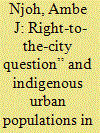

|
|
|
|
|
| Summary/Abstract |
This paper explores the implications of state land tenure modernization and urbanization-promotion initiatives for human rights in Cameroon. The aim is to promote understanding of the implications of these initiatives for the right-to-the-city of indigenous urban residents. It is argued that the implications are more severe in politico-administrative headquarters than elsewhere in the country. Three different cities have served, at some point, as national politico-administrative headquarters in Cameroon, the study’s empirical referent. The designation of any city as a politico-administrative headquarters invariably creates a land scarcity problem in that city. The problem is aggravated for the city’s indigenous population by colonial and post-colonial planning policies. For this reason, the policies are said to be in violation of basic human rights as stipulated by the UN Declaration of Universal Human Rights as well as the African Charter.
|
|
|
|
|
|
|
|
|
|
|
|
|
|
|
|
| 5 |
ID:
179103
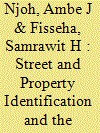

|
|
|
|
|
| Summary/Abstract |
The study employs in-situ primary data supplemented with secondary information from conventional archival sources to examine the toponymic experience of Ethiopia, one of only two African countries without a colonial history. The focus is on Mekelle, the country’s third largest city. The city’s spatial structure is nondescript. The streets are identified with a string of numbers, which are placed at irregular intervals. Most landmarks are unnamed whereas buildings are unnumbered. This paper shows that the absence of a precise and unambiguous street, place and property identification system in the city stifles its performance in the urban management, economic, and social milieus.
|
|
|
|
|
|
|
|
|
|
|
|
|
|
|
|
| 6 |
ID:
157195
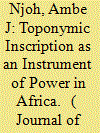

|
|
|
|
|
| Summary/Abstract |
This study analyses toponymic inscription, the exercise of street/place naming, as a tool for articulating power in Anglophone and Francophone Africa. The focus is on Dakar, Senegal and Nairobi, Kenya, which were respectively indispensable for the colonial projects of France and Britain in Africa. Dakar was for France’s West African Federation what Nairobi was for Britain’s colonial East Africa. It is shown that toponymic inscription was used with equal zeal by French and British colonial authorities to express power in built space. Thus, both authorities used the occasion to christen streets and places as an opportunity to project Western power in Africa. With the demise of colonialism, indigenous authorities in Kenya inherited the Western vocabulary of spatiality but speedily moved to supplant Eurocentric with Afrocentric street/place-names. In contrast, post-colonial authorities in Senegal remain wedded to the colonial tradition of drawing most important street- and place-names from the Eurocentric cultural lexicon. Consequently, although the vocabulary of spatiality in Nairobi projects African nationalism and power, that of Dakar continues to express mainly Western power.
|
|
|
|
|
|
|
|
|
|
|
|
|
|
|
|
| 7 |
ID:
137004
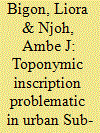

|
|
|
|
|
| Summary/Abstract |
We examine a variety of problems relating to toponymic inscription processes in urban sub-Saharan Africa. The objective is to promote understanding of: the origins, evolution, nature, extent and social implications of these problems in an era of globalization; the vocabularies of built space; and the navigation techniques of inhabitants of supposedly nondescript built space in this region. We employed primary data based on in situ experiences and secondary data from published and unpublished documents. We found that the region’s toponymic inscription problem, its built space, and urban vocabularies are deeply embedded in its European colonial legacy. Furthermore, we found that urban residents in this region have devised functional means to navigate their seemingly nondescript space. These revelations promise to fill some historiographic gaps in the literature on toponymic inscription in Africa in particular and urban history and planning in general.
|
|
|
|
|
|
|
|
|
|
|
|
|
|
|
|
| 8 |
ID:
168250
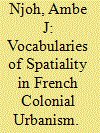

|
|
|
|
|
| Summary/Abstract |
The study analyses toponymic practices in two colonial spaces on two continents. The colonial spaces, Dakar and Saigon, were capitals of the Federation of French West Africa and French Indochina, respectively. Toponymy is used as a tool to articulate socio-cultural and political power in both spaces; also, streets were christened after French military, politico-administrative and religious personalities. Two differences are noted. First, streets in colonial Saigon were named after French military heroes and clergymen, while streets in Dakar were named after French political luminaries. Second, post-colonial Saigon witnessed efforts to re-appropriate the city’s identity, but not so in Dakar.
|
|
|
|
|
|
|
|
|
|
|
|
|
|
|
|
|
|
|
|
|